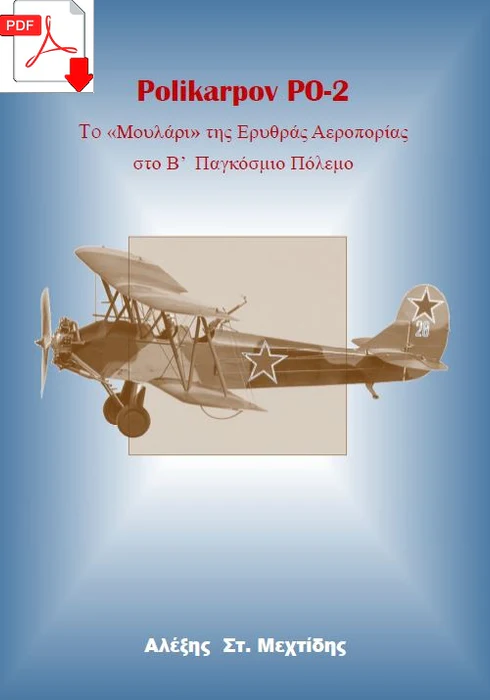
Mehtidis, Alexis - The Polikarpov PO-2 - A monography (ebook)
The Polikarpov PO-2
Alexis Mehtidis
One of the most extraordinary aircraft in the history of aviation, the Polikarpov PO-2 was built in about 30,000 units from 1929 to 1949 (17,000 in 1941 to 1945). It remained in service until 1962, and during the Second World War it was used not only as a training aircraft, but also as a light bomber, liaison aircraft, message carrier and seaplane.
PO-2/U-2s were first used as light bombers on the southern front in August 1941, armed with four 50 kg bombs and, in many cases, with a machine gun. Early reports mention that on the Odessa front, naval personnel threw hand grenades.
Thereafter, many regiments of light night bombers were formed. The crews were "released" into operation after about 15 hours of training. The manual stated that "the aircraft must approach the front line at an altitude of 1,500 m. Then the pilot must "shut down the engine" to approach as quietly as possible and re-start the engine 300 m from the target.
In the absence of sights, the pilots marked the wings with chalk so that they could aim "approximately". In addition, it was not uncommon to have the navigator climbing out of the cockpit and walk on the wing to untangle the wires that controlled the release of the bombs.
The Soviet history has of course retained the female crews – “the night witches”, some of which distinguished themselves by flying up to 10 times a night (the airstrip was only 15 km from the front).
The last light bombings by PO-2 were carried out by the North Koreans from 1950 to 1953. The first of these silent night raids took place on November 28, 1950, when a formation attacked the Pyongyang airport, destroying three American Mustang fighters of the 8th Reconnaissance Squadron. This earned the PO-2, the American nickname of "Bed check Charlie", the communist who comes to check if everyone is in bed.
16 pages – in Greek





